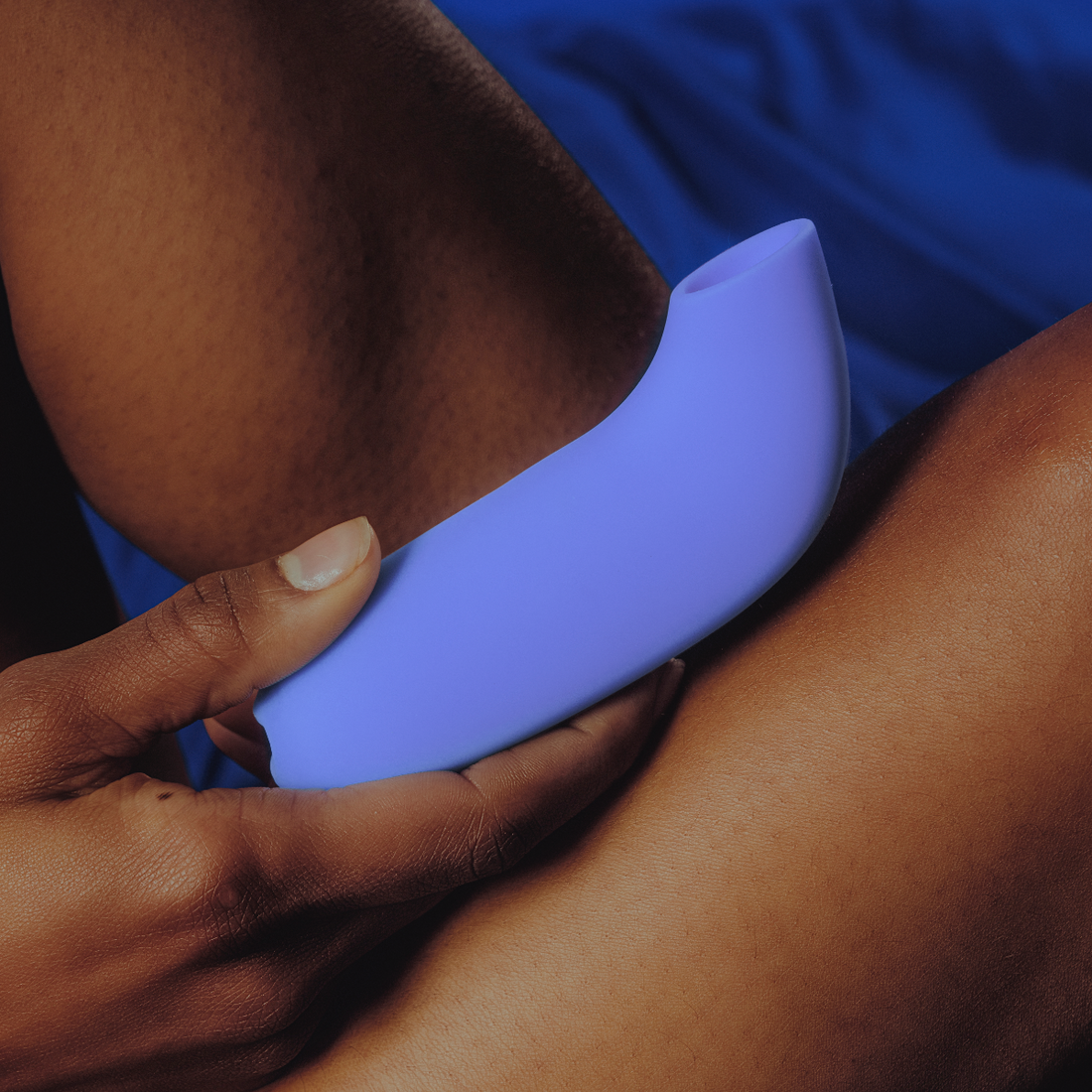Erectile dysfunction, or the inability to get and maintain an erection that is firm enough for penetrative sex, is really, really common. Erectile dysfunction is believed to affect about 30 million cisgender men in the United States alone, and although it’s more common with increased age, it isn’t something that only older people deal with. In fact, a 2013 study published in the Journal of Sexual Medicine found that 1 in 4 patients seeking first-time medical help for new erectile dysfunction was younger than 40. To be clear, erectile dysfunction isn’t just not being able to get hard once or twice in your sexual history. It’s persistent, meaning that much or all of the time you want to get hard, you can’t. Erectile dysfunction isn’t the lack of sexual desire, though. While someone experiencing erectile dysfunction might also experience low or no sexual desire, ED often happens even when someone really wants to have sex and is feeling psychologically turned on. Because we tend to wrongly assume that physical responses = desire, Dr. Carol Queen, staff sexologist at Good Vibrations, notes that many partners of people with erectile issues might feel hurt and frustrated — like the lack of an erection means that their partner doesn’t find them attractive. But as Queen notes, “This is often not at all what a lack of erection means! It might not ‘mean’ anything except that the person with ED needs to get a really thorough check-up…It might mean that the person dealing with erection issues is ashamed and won't talk about it. It might mean that they are aging and simply need a little more hands-on stimulation to get an erection — which is common, but if neither partner knows that, it can seem like a crisis.”
Creating a sexual menu of all of the things that you enjoy during sex can be one of the most helpful (and cost-effective) tools.
Erectile difficulties can be frustrating on your own and in your relationship — particularly if you or your partners don’t understand what’s going on. So, let’s break down the potential causes and treatments, and unpack how you can still have pleasurable sex with or without an erection. But before we get started, remember: ED can have many different causes, and treatment options vary. This isn’t medical advice, just educational information, so if you’re experiencing issues with your erections, talk with your doctor!
Potential Causes of Erectile Dysfunction
If you’re driving along an interstate highway, you might see billboards advertising treatments for low testosterone. While many people assume that ED is almost always the result of low testosterone, that’s only true some of the time. Testosterone levels decrease with age (and as the result of other health conditions), but having infrequent, unsustainable, or absent erections isn’t just a problem for senior citizens. Erectile dysfunction is often a symptom of something else going on in the body or mind. Sometimes, the underlying cause is psychological — depression, anxiety, stress, relationship issues, low body image, sexual trauma, and high levels of self-criticism or performance stress can all make it more difficult to get (and stay) hard. There are many common physical conditions that can impact erections, too – high cholesterol, high blood pressure, diabetes, tobacco and alcohol use, atherosclerosis, and heart disease can all cause erectile issues. Frustratingly, some of the medications to treat these conditions can also cause erectile dysfunction. SSRIs (most commonly used to treat depression and anxiety), beta blockers (used to prevent a second heart attack), and hydrochlorothiazides (used to treat high blood pressure) all can affect both erectile ability and levels of sexual desire. Cancer treatments commonly have sexual side effects (including ED), too.
The cardiovascular system is a major player here. In fact, one study found that nearly 70% of people with erectile dysfunction later were diagnosed with cardiovascular disease. Erections require blood flow, and erections happen when the arteries in the penis are able to dilate, allowing more blood to enter the penis. So, if the heart isn’t able to pump blood at its expected capacity, or if the arteries are congested, erections may become infrequent or they may come and go. In fact, erectile dysfunction often appears before other cardiovascular issues are diagnosed. So if you’re having persistent issues with your erections, it’s worth checking in with your doctor. Other conditions, like Parkinson’s disease, multiple sclerosis, Peyronie’s disease, spinal cord damage, and prostate issues can also cause erectile difficulties. Prostatectomy, the removal of part or all of the prostate as a treatment for prostate cancer, can lead to erectile dysfunction in the short and long term. Some studies also show that erectile dysfunction may be among the longterm effects of COVID-19, too. Transgender women and other transfeminine folks taking gender-affirming hormone therapy (estrogen, testosterone blockers, and progesterone) who haven’t had vaginoplasty may also experience fewer or less firm erections.
Managing and Treating Erectile Dysfunction
Treatment for ED is rarely just medical in nature – instead, it tends to follow a biopsychosocial model. That means that it incorporates your physical health factors and medical history (bio), your mental health (psycho), and your belief systems and social supports (social). Your sexual health is deeply tied to your overall health, so treating ED isn’t as simple as popping a little blue pill.
Check for Underlying Issues
Because the causes of erectile dysfunction can vary greatly, it’s important to talk with your doctor about what’s going on. Remember, ED is common, and there’s no shame in experiencing it! When talking with your primary care doctor or a urologist about erectile dysfunction, they’ll likely recommend a genital exam, a cardiovascular exam, and potentially a rectal exam (to check on your prostate). They may also order some basic lab work — so come hydrated and prepare to pee in a cup and maybe get some blood drawn, too. You and your doctor may already know that you have a health issue that inhibits erections (scroll back up to the “causes” section if you skipped it!). In that case, you might have a conversation about changes to your treatment plan that could help alleviate your erectile symptoms. If your erectile issues are new, but your preexisting health conditions have been around for a while (like if you’ve had diabetes for 10 years, but you’ve only struggled with erections for a few months) be sure to mention that to your doctor. Timeline is important, and it can help signal to them that they should test for other causes, too. Remember, erectile dysfunction isn’t just about what’s happening with your penis. It can also be connected to diabetes, prostate issues, high blood pressure, depression, and more — so prepare for a broad range of questions that will vary based on your age and medical history. If there is a physical cause of your erectile issues, your treatment plan will vary based on the issue and can include a wide range of options.
PDE5 Inhibitors for Erectile Dysfunction
Remember how I said that treating ED is more complicated than just taking a little blue pill? That’s true – and you still might be prescribed an oral medication to help you get erections. While Viagra is the most well-known erectile dysfunction pill in the United States, it’s not the only one – there’s also Levitra, Cialis, and Stendra. These are all called PDE5 inhibitors. Let’s take a quick and very abbreviated look at the biochemistry at play here. Erections happen because nerves and endothelial cells (the cells in your blood vessels) release nitric oxide. Skip forward a few steps, and the nitric oxide leads the body to produce cGMP (cyclic guanosine monophosphate, if you want to be fancy) which then tells the body to lower intracellular levels of calcium. That then causes smooth muscle relaxation, which leads to increased blood flow, and then…erection! PDE5 (or, if you prefer the full name, Phosphodiesterase-5) is an enzyme that exists in your blood vessels, and it’s very prominent in the corpus cavernosum (one of the types of erectile tissue in the penis). PDE5 actually breaks down cGMP, which can lead to erections not happening. Enter PDE5 inhibitors. This type of drug works by temporarily binding to PDE5 and blocking it from breaking down the cGMP. This lets nitric oxide do its thing to increase blood flow, which can then help make erections possible.
Explore all of the ways your body can bring you pleasure – erect or not.
But there’s a catch — PDE5 inhibitors are not magic. They only work when they’re used to treat erectile dysfunction caused by physiological issues (like cardiovascular disease). They don’t work well when ED is primarily caused by psychological issues like stress or depression, and they also don’t work for folks who have nerve function issues in the penis. For people who have diabetes or cancer, PDE5 inhibitors are less effective (but may still help a bit). You should not use PDE5 inhibitors if you also take nitrates or alpha-blockers, because they can lead to extremely low blood pressure and even loss of consciousness. Other medications may require you to adjust your dosages, so make sure your doctor knows about all medications that you take (including supplements). You should also not use poppers along with any PDE5 inhibitor. Poppers are a recreational drug that many people use to increase sensation, lower inhibitions, and relax the muscles (especially for anal play). They’re also a nitrate. Using poppers while taking a PDE5 inhibitor can dangerously lower your blood pressure and can even cause a stroke or heart attack, so don’t combine the two. In short, if you’re experiencing erectile dysfunction, don’t just ask a friend for some of their Viagra – talk with your doctor and make sure it’s the best and safest option for you.
Make an Appointment with a Sex Therapist
While TV shows and movies might make it seem like sex therapists actually watch you have sex (or that they have sex with you), that’s not the case at all. Sex therapists are mental health care providers who have additional expertise in sexuality-related issues. It’s important to know that while some states, like Florida, have regulations that only permit people with advanced sexuality-related training to use the title “sex therapist”, the vast majority of states don’t have any additional training requirements. One way to make sure that your therapist is proficient in sexuality topics is to see if they’re AASECT-certified. You can also ask a prospective therapist what types of continuing education they’ve done related to sexuality issues. Daniel Sher, a clinical psychologist with Between Us Clinic shared that “Erectile issues can set a person up to think and feel in a way that promotes shame and a self-critical attitude. These powerful psychological factors can cause significant performance anxiety, which then has the power to trigger erectile issues by hijacking communication between the brain and genitals.” Therapy can help rebuild the mind-body connection and break the anxiety loop that can be contributing to your erectile issues and early studies have found that mindfulness may have a positive effect on erectile ability. Because erectile dysfunction can be tied to other mental health factors and can cause additional stress or relationship conflict, a sex therapist can help you navigate the emotional challenges, reset expectations, and communicate more effectively with your partners. And even if your ED does have purely medical roots, it may still be effecting other areas of your life – a therapist can help you navigate those, too.
Pleasurable Sex with Erectile Dysfunction
Many of us are taught that the physiological signs of sexual arousal, like vaginal wetness and penile erections, are key to having really good, hot sex. This belief is deeply based in the belief that penis-in-vagina sex is “regular sex” and everything else on the sexual menu is just there as a frill. The reality is that you don’t need a hard penis (or a wet vagina) to have pleasurable sex. In fact, erections don’t necessarily indicate if someone is turned on. Someone might be psychologically aroused, but still be soft, just like someone might be erect during a decidedly not sexy situation. So, don’t assume that a soft penis is the end of your sex life. It just might be the end of some unrealistic sexual expectations! Penises are highly sensitive, and they’re responsive to touch stimulation whether they’re erect or not. While increased bloodflow can also increase sensitivity, erections aren’t an on/off switch indicating if pleasure is happening or not. Soft penises can still feel pleasurable sensations, ejaculate, and reach orgasm. As Queen notes, “Many people with penises (and their partners) don't even try to find out how much pleasure is possible without an erection — because they assume means ‘game over’ for sex.” Defaulting to penetrative sex may be your norm, but it probably isn’t the only thing that you enjoy in the bedroom. Ask yourself the following questions:
- Where did I learn that penetrative sex is “normal sex”?
- What was I taught about oral sex, manual stimulation, and using toys in the bedroom?
- Do I connect my erection with my sexual confidence and skill? Why?
- Do my partners put pressure on me to have or maintain an erection? What do they believe that my erection says about them?
- What are all of the ways I feel sexual pleasure and connection?
Those questions can help you get to the root of some of your beliefs around erections, sexual confidence, and sexual “performance.” Creating a sexual menu of all of the things that you enjoy during sex can be one of the most helpful (and cost-effective) tools. If you’re partnered up, I recommend that you and your partners each make your own menu — then, come together to compare notes and make a shared menu. Is oral sex on the menu? What about mutual masturbation? Using toys on each other? Hand stuff? Sensual massage? Sexting? The sexual world is more vast than we often assume at first glance, so set aside the time to really consider everything that could be pleasurably on the table. Thinking intentionally about what you do in the bedroom can help you better know yourself and your partner, and it can also give you more choices, too. Plus, as Queen shares, de-centering an erection can actually increase pleasure for all partners because they “may discover delicious sensations they had never explored before.” While you may think that vibrators are only meant for clitoral or vaginal use, they can actually be used by anyone! A wearable vibrator like Fin can be used to intensify a teasing touch, a flexible vibe like Pom can feel great cupped against the testicles, and wand vibrators like Com can be used all over the outside of the body. Vibrators aren’t the only toys that can be incorporated into your sex life; stretchy silicone cock rings can be worn to help erections stick around longer, while prostate play can be intensely pleasurable. People with penises can even use strap-ons to bring penetration back into the mix. The cool thing? All of these options can be combined into whatever is exciting and pleasurable for you. No matter what accoutrements you bring into the bedroom, communication is key. Open, nonjudgmental communication can relieve sexual pressure (which can actually make erections more likely to appear) and can also set expectations. So, don’t shy away from talking about your worries, desires, and boundaries with your partners — whether you’re experiencing erectile dysfunction or not. As Queen shared, the only reason why erectile dysfunction would end your sex life is because you’ve decided that it has. Otherwise, chat with your health care team, pursue treatment options, and explore all of the ways your body can bring you pleasure – erect or not.





















































